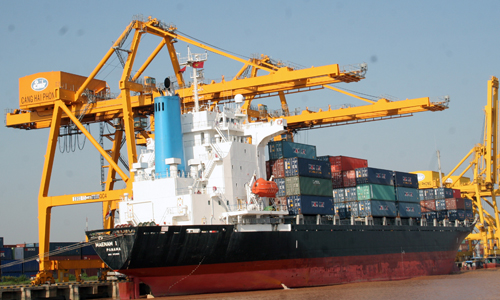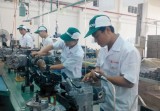Vietnam invites foreign investors to purchase shares of SOEs
The message about Vietnam’s open-door, favorable policies for foreign investors was delivered again and again by government officials recently.
The state-owned sector has just three months to complete the plan to privatize 432 state-owned enterprises (SOEs). This process has gone very slowly; only 61 SOEs were equitized in the first half of 2015. The number was also small in 2014, with 143 companies.
A recent report of the Asian Development Bank (ADB) analyzed major obstacles to this task, saying the biggest was the lack of strategic investors willing to purchase shares in the initial public offerings (IPO).
"Although Vietnam has relaxed the ownership ratio of foreign investors, investors are concerned about the issues of corporate governance and financial transparency," the ADB report said.
In this context, Vietnamese officials have recently conducted investment promotion events both at home and abroad to accelerate the sale of state capital, such as a conference with international investors in New York (USA) in July and the Vietnam Global Investment Forum held last week in Hanoi by the Ministry of Planning & Investment and Euromoney Magazine.
"Vietnam is always concerned about how to help foreign investors purchase shares of state-owned enterprises effectively and profitably," said Mr. Pham Viet Muon, former deputy head of the Steering Board for Enterprise Innovation and Development, who has worked for many years in the field of equitization.
According to Muon, investors have paid huge attention to the ownership ratio at SOEs. In late 2014, Vietnam issued detailed information on the ownership ratio of foreign investors in Vietnamese firms in all areas. However, the sale of state capital has been still low since then. One of the reasons for this is that foreign investors usually conduct thorough research, which can take up to 4-5 years in some cases.
"If foreign investors spend a lot of time for survey and research, they will lose their chance,” Muon said.
However, foreign investors pointed out the limitations of Vietnam, mainly related to information transparency and corporate governance.
A recent report said that many state enterprises did not take seriously the disclosure of information, which made investors feel insecure.
Muon acknowledged that lack of transparency was the weakness of Vietnamese enterprises, and that this must be improved in the future.
In addition, quality shares are “rare” on the market; for example, the case of Vietnam Airlines, which sold only nearly 3.5% stake to outsiders, and the Bank for Investment and Development of Vietnam (BIDV) with over 4%.
"Many companies sold very low rates of shares to the outsiders. In the past two years, only one third of the shares in the privatization process sold," said Andy Ho, Director of a VinaCapital investment fund.
In the IPO for Hai Phong Port, the SGRF from Oman directly asked for the Vietnamese Prime Minister’s permission to buy all of the capital that the State was planning to divest itself of at the largest seaport in the North.
Even if the subsequent divestiture exceeded the ownership rate allowed foreign investors to own, the fund was willing to cooperate with domestic companies introduced or specified by the Government.
Dang Quyet Tien, Deputy Director of the Corporate Finance Department of the Ministry of Finance, said the government has created a regulatory framework for disclosure of information on State enterprises as public firms.
For the SOEs that have not sold state capital, the authorities are reviewing to sell the remaining shares, including the sale of all the stakes to strategic stakeholders.
"I expect that the strategic investors to purchase are more powerful. We are pushing to the market about VND200,000 billion, equivalent to $10 billion. Gradually the investors and us must stand together on one side, not the two sides," Muon stressed.
As an investor who had bought shares of equitized enterprises, Pham Quang Dung, Vice Chairman of Thang Long Corporation, said this was the most favorable time for foreign investors because the Vietnamese government is creating favorable conditions for them.
Prime Minister Nguyen Tan Dung last week conveyed a message in front of over 700 global investors that Vietnam welcomes foreign enterprises to invest in the long term in Vietnam and wants to have a dialogue with them for mutual success.
Vietnamnet/Nam Son
 Phu Giao bound for sustainable development
Phu Giao bound for sustainable development
 Building Binh Duong into a regional connectivity hub
Building Binh Duong into a regional connectivity hub
 PM demands special mechanisms for Noth - South high-speed railway project
PM demands special mechanisms for Noth - South high-speed railway project
 Listening, solving problems, supporting enterprises to develop
Listening, solving problems, supporting enterprises to develop
 Bau Bang district Association of Women coordinates to introduce and connect OCOP
Bau Bang district Association of Women coordinates to introduce and connect OCOP
 Towards sustainable economy
Towards sustainable economy
 Provincial Trade Union supports VND53billion, 100 tons of goods for flood and storm-hit people
Provincial Trade Union supports VND53billion, 100 tons of goods for flood and storm-hit people
 Supporting enterprises in promoting automation
Supporting enterprises in promoting automation
 New motivation for Thuan An city to develop
New motivation for Thuan An city to develop
 Taking advantage of new opportunities in investment attraction
Taking advantage of new opportunities in investment attraction









